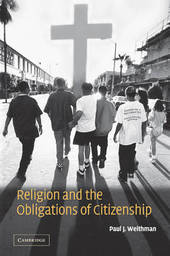
|
Religion and the Obligations of Citizenship
Paperback / softback
Main Details
| Title |
Religion and the Obligations of Citizenship
|
| Authors and Contributors |
By (author) Paul J. Weithman
|
| Physical Properties |
| Format:Paperback / softback | | Pages:240 | | Dimensions(mm): Height 227,Width 150 |
|
| Category/Genre | Religious social and pastoral thought and activity |
|---|
| ISBN/Barcode |
9780521027601
|
| Classifications | Dewey:201.72 |
|---|
| Audience | | Professional & Vocational | |
|---|
| Illustrations |
Worked examples or Exercises
|
|
Publishing Details |
| Publisher |
Cambridge University Press
|
| Imprint |
Cambridge University Press
|
| Publication Date |
27 April 2006 |
| Publication Country |
United Kingdom
|
Description
In Religion and the Obligations of Citizenship Paul J. Weithman asks whether citizens in a liberal democracy may base their votes and their public political arguments on their religious beliefs. Drawing on empirical studies of how religion actually functions in politics, he challenges the standard view that citizens who rely on religious reasons must be prepared to make good their arguments by appealing to reasons that are 'accessible' to others. He contends that churches contribute to democracy by enriching political debate and by facilitating political participation, especially among the poor and minorities, and as a consequence, citizens acquire religiously based political views and diverse views of their own citizenship. He concludes that the philosophical view which most defensibly accommodates this diversity is one that allows ordinary citizens to draw on the views their churches have formed when voting and offering public arguments for their political positions.
Author Biography
PAUL J. WEITHMAN is Associate Professor of Philosophy at the University of Notre Dame. He is editor of Religion and Contemporary Liberalism (1997) and co-editor of the five-volume Philosophy of Rawls (with Henry Richardson, 1999).
Reviews'Religion and the Obligation of Citizenship is a terrific book, replete with subtle insight, sympathetic exegesis, moral seriousness, and trenchant argument. ... No one interested in the current state of the discussion on religion and politics can afford to miss this book.' Ethics
|